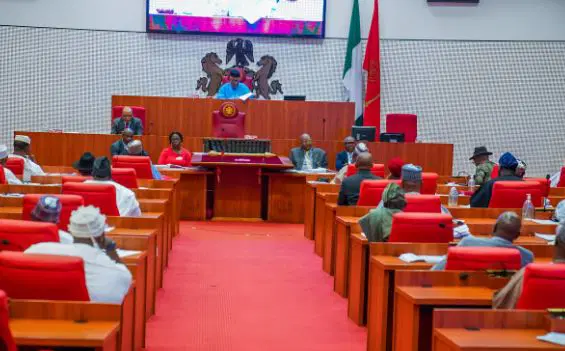Senate Set to Ignite Debate on Justice for Victims of Violence

By John Alechenu
Unless unforeseen developments arise, the Senate is scheduled to deliberate on Tuesday a motion advocating for justice and accountability for all victims of violent crimes, regardless of their religious affiliations.
The motion, entitled “Urgent need to address misconceptions surrounding the alleged Christian Genocide Narrative in Nigeria and the international community,” is sponsored by Senators Ali Ndume (APC, Borno), Sani Musa (APC, Niger), Magatakarda Wamako (APC, Sokoto), and Ibrahim Bomai (APC, Yobe).
Insiders reveal that this motion is likely a response to remarks made by American political commentator and TV host Bill Maher, who, in a widely circulated address, claimed that terrorist groups are waging a genocidal campaign against Nigerian Christians.
The motion’s sponsors urge the Senate to:
- “Call on the Federal Government to guarantee justice and accountability for all victims of violent attacks-whether Christian, Muslim, or from other faiths-to combat impunity and restore public trust in government institutions.”
A draft of the motion obtained in Abuja on Monday highlights the sponsors’ intent to dispel misinformation about the actual nature of Nigeria’s ongoing conflict.
While the Senators acknowledge the grievous and unacceptable assaults on Christian communities in certain regions, they emphasize that violence has impacted Nigerians across all religious groups.
They caution that framing the crisis solely as a religious conflict risks deepening sectarian divides, misdirecting international policy, and weakening national solidarity.
The motion states: “The Senate recognizes Nigeria as a diverse nation with multiple ethnicities and religions, whose peace and stability depend on mutual respect, responsible communication, and truthful representation of facts.
“It is concerned about the growing spread of narratives-both domestically and internationally-that allege an ongoing ‘Christian genocide’ in Nigeria, narratives that have been amplified by some foreign media, advocacy organizations, and religious networks.
“Further concern arises from the fact that these emotionally charged narratives often overlook the complex realities of Nigeria’s security challenges, potentially fostering sectarian distrust, distorting global perceptions, and undermining national unity and diplomatic relations.”
The motion also notes that Nigeria has faced significant security threats in recent years, including terrorism, insurgency, banditry, communal clashes, and targeted violence, affecting citizens from various religious, ethnic, and regional backgrounds, with both Christian and Muslim communities suffering losses.
It recalls that the 1999 Constitution of the Federal Republic of Nigeria (as amended) guarantees freedom of religion, equal legal protection, and mandates the government to safeguard the lives and property of all citizens, irrespective of faith or ethnicity.
The motion underscores the importance of accurate information and responsible leadership in preventing sectarian strife and countering extremist narratives.
It expresses concern over recent actions in the US Senate and Congress, where efforts have been made to designate Nigeria as a “Country of Particular Concern,” a foreign policy measure targeting human rights or religious freedom violations.
The sponsors request the Senate to:
- “Reject the sweeping characterization of Nigeria’s security issues as a ‘Christian genocide,’ affirming instead that the conflicts stem from intricate socio-economic, ethnic, criminal, and terrorist factors that transcend religious boundaries.”
- “Urge the Federal Government, through the Ministry of Foreign Affairs, security agencies, and relevant stakeholders, to enhance transparent, data-driven public communication by providing accurate casualty statistics, context, and investigative findings to counteract misinformation.”
- “Call on religious leaders, civil society groups, and the Nigerian media to exercise caution and responsibility in their public discourse and reporting, avoiding language that could exacerbate sectarian tensions or misrepresent the national situation.”
- “Encourage diplomatic missions, particularly the US Embassy, international organizations, and foreign media to base their reporting on verified, balanced, and credible sources-including security agencies, local communities, and independent observers-when covering religiously sensitive matters in Nigeria.”
Furthermore, the motion mandates the Senate Committees on Foreign Affairs, Information, National Security and Intelligence, and any other relevant committees to:
- “Collaborate with the Executive branch to formulate a unified national communication strategy aimed at correcting misinformation about religious violence.”
- “Engage with the US Senate and Congress, international partners, and diaspora networks through official briefings and fact-based publications to dispel misunderstandings.”
- “Support interfaith peace initiatives that highlight shared suffering and promote national unity.”li>







